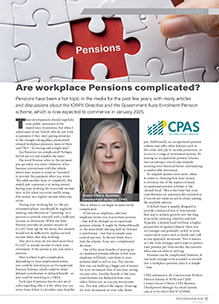Pensions have been a hot topic in the media for the past few years, with many articles and discussions about the IORPII Directive and the Government Auto Enrolment Pension scheme, which is now expected to commence in January 2025. In the latest Irish Construction News magazine, SUSAN O’MARA, Business Development Manager, CPAS (CIF Pension Administration Services), explains the latest developments.

These developments should hopefully raise public awareness of the importance of pensions, but when I asked some of my friends who do not work in pensions if they were paying attention to the changes taking place, particularly around workplace pensions, most of them said “NO! – Its boring and complicated.”
Are Pensions too complicated? Perhaps, but let me try and simplify the topic!
Pension explained
The word Pension refers to the payment you get when you retire. However, it has become synonymous with the vehicle where your money is saved or “invested” to provide this payment when you retire. This adds another layer of complexity. But simply put, a pension is:
a) saving money during your working life to provide income later in life when you retire and
b) using that money as a regular income when you retire.
During your working life, i.e. the preretirement phase, you should be regularly making contributions or “investing” in a pension to provide yourself with a sufficient income in retirement. While the State Pension provides an annual income of €12,927 from age 66, for many, that amount would not be sufficient to replace earned income when they stop working.
That part is easy, do you need more than €12,927 in annual income to enjoy your retirement. If the answer is yes, you need a pension.
Here is where it gets complicated, depending on your employment status, you could be investing in an Occupational Pension Scheme, which could be either
defined contribution or defined benefit – or you could be investing in a PRSA.
Each type of pension has its own set of rules regarding who it is for, when you can retire from it how it calculates your benefits. This is where it can begin to seem overly complicated.
Workplace pensions
If you are an employee, and your employer invites you to join their pension – that will be through an occupational pension scheme. It might be Defined Benefit or the most likely offering with be Defined Contribution – but that is outside your control anyway. So do not think twice.
Join the scheme. Easy, not a complicated decision.
One of the main benefits of joining an occupational pension scheme is that your employer will likely contribute to your pension fund as well as you. This means that you can build up a bigger pot of money for your retirement than if you were saving on your own. Another benefit is that your contributions are deducted from your salary before tax, so you pay less income tax. This also reduces the impact of saving for your retirement on your take-home pay. Additionally, an occupational pension scheme may offer other features such as life cover, sick pay or income protection, or access to a range of investment options. By joining an occupational pension scheme, you are taking a crucial step towards securing your financial future and enjoying a comfortable retirement.
To simplify matters even more, when it comes to choosing how your money is invested, one of the aspects of many occupational pension schemes is the ‘default fund.’ This is the fund that your contributions are automatically invested in if you do not make an active choice among the available options. A default fund is usually designed to provide a balanced mix of investments that aim to achieve growth over the long term while reducing volatility and risk.
Typically, a default fund will have a higher proportion of equities (shares) when you are younger and gradually switch to more conservative assets such as bonds and cash as you approach retirement. This is known as a life-style strategy, and it aims to protect your pension pot from market fluctuations when you are close to retiring. Pensions can be complicated, however, if you lucky enough to be included or invited into a workplace pension, then it is simple
– Join.
ABOUT CPAS
CPAS are the specialists when it comes to pension provision and financial advice for employers and staff in the construction sector. CPAS administer the Construction Workers Pension Scheme, the Construction Executive Retirement Savings (CERS).
For more details, contact Susan O’Mara via email (susan@cpas.ie) or phone 01 223 4949.






